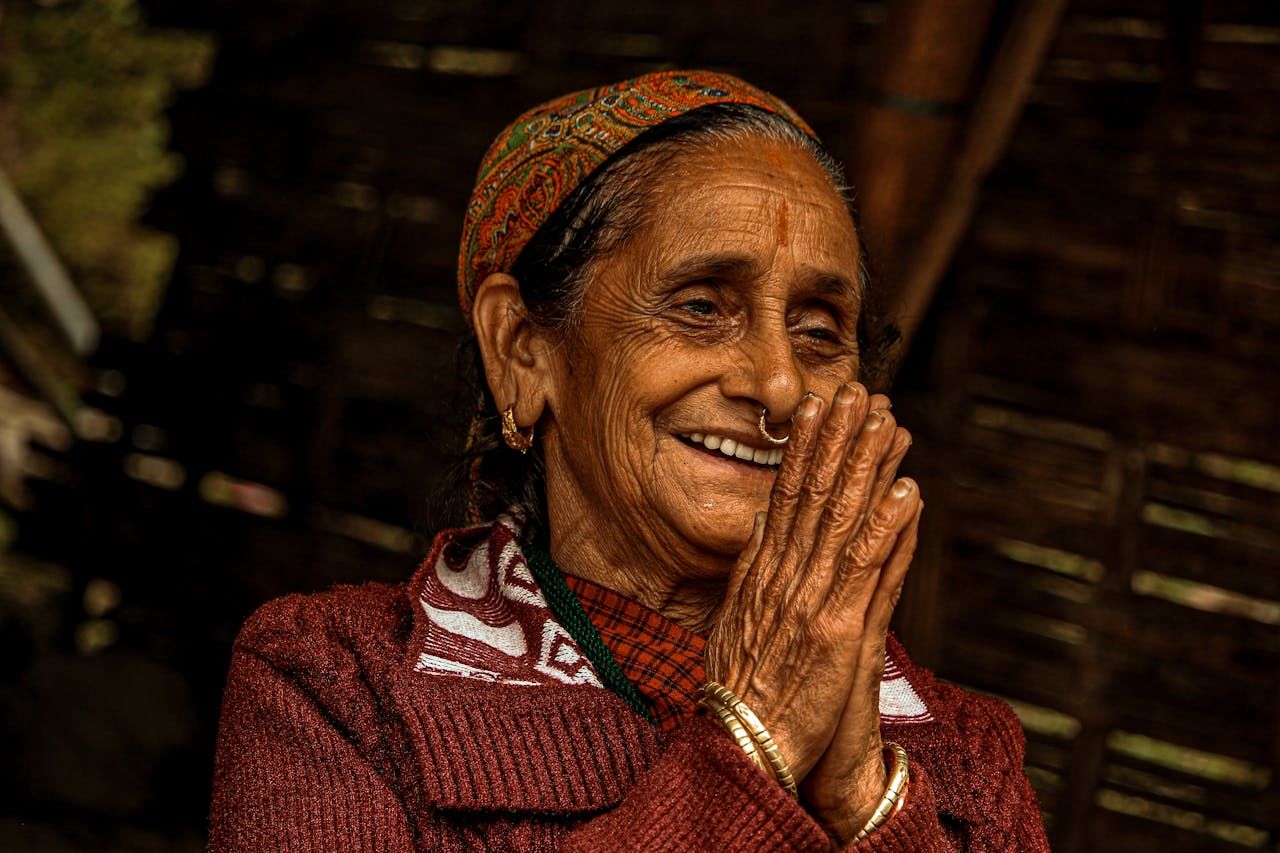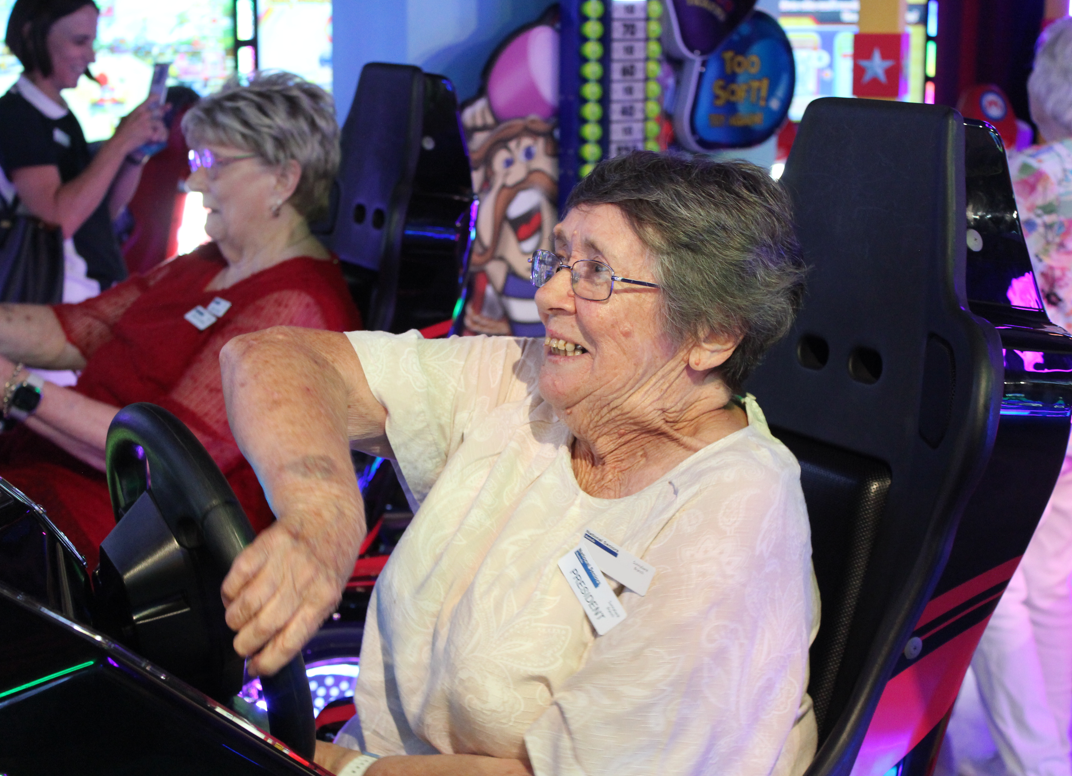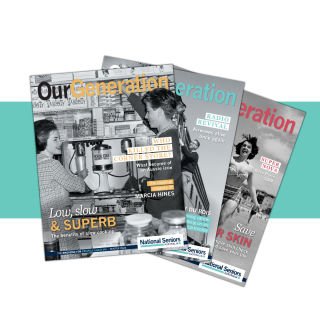11 ways to make older Australians happier
A new NSA report explores 11 paths to happiness among older Australians, based on 2,516 survey comments.


Sharing the fun
- A group of happy seniors took our new report for a test drive recently at Archie Bros Arcade Bar in Brisbane, where they shared a laugh while bowling and playing video games.
- The event was hosted by NSA CEO, Chris Grice, who said, “As the findings reaffirm, each one of us is unique. While ‘government subsidised red wine’ made the list in good humour, this report helps us to remember and celebrate older people’s diversity and complexity.
“Our personas are a celebration and recognition of the diversity of older people. There are many ways to
grow old and older people can’t and shouldn’t be boxed into ageist stereotypes.
“If we want a society that is happy, it is important to embrace and celebrate these differences.”
- 9News came along for the fun, and you can watch their report here.
If we asked you to describe something that would maintain or increase your happiness, what would you say?
The NSA Research Team asked participants in this year’s National Seniors Social Survey to do just that.
The result is a new report that explores 11 different ways of thinking about happiness among older Australians.
This work matters because, as an advocacy organisation, the wellbeing of older people is core to our business.
While broadscale structural and societal factors are our usual focus, we also know that individuals’ responses to those factors can vary.
The somewhat elusive concept of “happiness” is a way of drilling into those individual differences.
As our wellbeing includes our mental health, and happiness is an obvious part of that picture, it’s fitting that we launch the affectionately dubbed ‘Happiness Report’ to coincide with Mental Health Month (October).
Eleven faces of happiness
When we asked the happiness question, 2,516 survey respondents aged 50 to 97 gave an answer.
As you can imagine, the 2,516 comments our respondents wrote were extremely diverse. Happiness means different things to different people.
That’s the take home message really – how different we all are – older people cannot be boxed into stereotypes.
But we asked a survey question, so we had to try and make sense of what the 2,516 people said.
We’ve asked a lot of survey questions in the past, and from experience we know the issues that will come up time and again on people’s wish lists.
More money, better health, secure housing, quality aged care, and human company are some of the most common.
Those things were mentioned among the happiness comments too. So, we could have taken that same “issues” approach to analysing the 2,516 comments.
But that seemed a pointless activity, telling us what we already know.
Instead, we thought outside the box and sliced the comment set differently.
We tried to read between the lines to the deeper motivations that prompted people’s answers.
For example, more money is often a pathway to happiness for people who are feeling financially tight. In such cases it’s really about survival.
And quality aged care isn’t just a good thing for its own sake. It can be a pathway to happiness because it enables independence and control.
Thinking about people’s answers this way, we came up with 11 “personas” that seemed to capture what people really wanted, and these form the basis of the report.
The 11 personas go straight to the sources of happiness – the principles and ideals, beliefs and habits, priorities and desires that shape our personalities and drive our lives.
The 11 personas and their typical routes to happiness are:
Survival Realists. Happiness is having enough money to cover the basics including housing, and where possible a little bit extra.
Fierce Independents. Happiness is staying independent through great health, wealth, and care, and having control of our life choices.
Keen Participators. Happiness is the time, money, and ability to pursue our interests, be they travel, hobbies, work, or volunteering.
Nest Featherers. Happiness is a great home life with a wonderful location, loving partner or solo bliss, and pets if we want them.
Social Connectors. Happiness is relationships with family, friends, or community members, and the means to find like-minded others.
Policy Enthusiasts. Happiness is improvements to retirement income, aged care, and other ageing support systems.
Global Idealists. Happiness is an active civil society, government integrity, and changes that protect the environment, social justice, and peace.
Stability Seekers. Happiness is a sense of security and certainty, or assurance that the life we’ve planned for won’t be upended.
Inner Peaceniks. Happiness comes from our own mindset, attitude, and approach to life, or our faith and spiritual connections.
Respect Warriors. Happiness is respect for the contributions older people make and have made and eliminating ageism.
Unique Individuals. What makes older people happy can be idiosyncratic: reiki, a broader range of sport on TV, or more reliable businesses.
Not just one thing
So which persona best describes you?
If you can’t pick one, you’re not alone!
Some commenters listed more than one thing that would make them happy, and each thing fit into a different persona.
People are complicated and can’t be reduced to a single persona. None of us is “just a Social Connector” or “pure Respect Warrior”, any more than we’re “just a boomer” or “only a nana”.
And, actually, they all sound like pretty good pathways to happiness.
Rather than a personality quiz, we see this list as a tool for blasting apart stereotypes of older people.
For example, we have different feelings about change.
When we’re in Stability Seeker mode, we want social and technological change to slow right down. One person wrote, “As you age, I believe, that happiness is very closely linked to security and certainty.”
But if we don our Global Idealist persona, we demand change on a big scale. Some commenters would find happiness in things like “peace in the world”, “action on climate change”, and “Justice, Justice, Justice!”.
And older people have different passions.
As Keen Participators we find happiness in fun activities that entertain and provide new experiences.
But wake up our inner Policy Enthusiast and we become passionate about reforming things like Age Pension rules, carers’ respite, and downsizing incentives.
This list helps us remember and celebrate older people’s complexity.
Each one of us, after all, is a Unique Individual, even if we don’t all want “government subsidised red wine” or “the Brisbane Lions to win two in a row” – the unique paths to happiness for two of our 2,516 commenters.
Creating a gorgeous report
For each persona the Research Team chose an iconic photo to accompany the description along with some example comments.
The aim was to create a beautiful report that showcases the diversity of older Australians in pictures as well as words.
It made us happy to produce something that we enjoy looking at, that shows how beautiful older people are.
We hope you enjoy it too.
Read the full report here.















